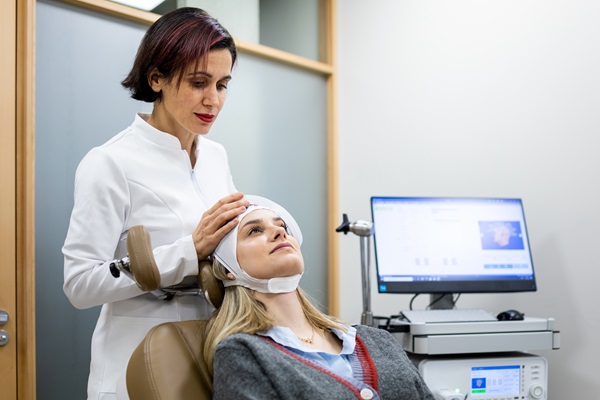How Transcranial Magnetic Stimulation Helps with Depression and Anxiety

Transcranial magnetic stimulation (TMS) is a cutting-edge treatment that offers hope for people dealing with depression and anxiety, especially those who have not found relief with medication or therapy. TMS is a non-invasive procedure that uses magnetic fields to stimulate specific areas of the brain involved in mood regulation. This innovative approach is helping many people improve their mental health and quality of life.
What is transcranial magnetic stimulation?
TMS is a treatment that focuses on stimulating the brain's prefrontal cortex. According to a medically reviewed article published in Verywell Health, the prefrontal cortex plays an integral role in affecting one's emotion regulation, behavior, personality, and ability to plan. During a TMS session, the psychiatrist places a device with an electromagnetic coil against the patient's scalp, sending gently magnetic pulses into the brain. These pulses help activate nerve cells in areas that may be underactive in those experiencing depression or anxiety.
The treatment is non-invasive, meaning no surgery or sedation is required, and is well-tolerated by most patients. Sessions typically last 20 to 40 minutes, and patients are awake and alert the entire time. TMS treatment plans usually involve multiple sessions over a few weeks, and many patients start noticing improvements after the first few treatments.
How TMS helps with depression
TMS is highly effective for people with treatment-resistant depression, a condition where traditional therapies like medication and psychotherapy (talk therapy) prove insufficient. Depression is often linked to reduced activity in certain areas of the brain, leading to symptoms like sadness, fatigue, and feelings of hopelessness. TMS helps by reactivating these areas, improving mood, and reducing the symptoms.
How TMS helps with anxiety
TMS is also effective for treating anxiety. Anxiety disorders are often a result of overactivity in parts of the brain that handle worry and stress. This overactivity can lead to feelings of restlessness, nervousness, and difficulty focusing. TMS works by calming these overactive areas, helping patients feel more relaxed and less overwhelmed.
For people who experience both depression and anxiety, TMS can be especially helpful. These conditions often overlap in the brain, and TMS can address both simultaneously, providing relief for many patients.
Benefits of transcranial magnetic stimulation
TMS offers many benefits that make it an appealing option for patients. It is non-invasive, so there is no need for surgery or medication, and patients can return to their normal activities immediately after each session. The treatment has minimal side effects, the most common being mild discomfort on the scalp or temporary headaches, which usually go away quickly.
One of the greatest advantages of TMS is its ability to focus on specific areas of the brain, making it highly effective while avoiding the side effects that often come with medications. For individuals who have struggled to find relief, TMS provides a new way to improve mental health and overall well-being.
Find relief with TMS
Transcranial magnetic stimulation is an innovative and highly effective treatment for depression and anxiety. It offers hope for people who have not found success with traditional treatments, giving them a chance to feel better and regain control over their mental health. If you or someone you know is considering TMS, contact Hope TMS and Neuropsychiatric Center to schedule a consultation.
Request an appointment here: https://www.hopetmsofny.com or call Hope TMS and Neuropsychiatric Center at (646) 578-8152 for an appointment in our New York office.
Check out what others are saying about our services on Yelp: Transcranial Magnetic Stimulation in New York, NY.
Recent Posts
Ketamine therapy employs a medication long used in anesthesia to treat depression and other mental health disorders. Traditional treatments for these disorders do not always work, and not everyone can tolerate the side effects of traditional drugs. Even though it is newer, psychiatrists are observing that ketamine is already showing promise in the treatment of…
Insomnia disrupts sleep patterns and negatively affects overall health, leading to fatigue, difficulty concentrating, and emotional distress. This condition can result from chronic stress, anxiety, depression, or medical issues that interfere with the body's natural sleep cycle. A psychiatrist can help diagnose and address insomnia, providing tailored treatments focusing on mental and physical well-being.Insomnia is…
Relationship obsessive-compulsive disorder (ROCD) is a distinct subtype of OCD that can cause persistent doubts and distressing thoughts about romantic relationships. OCD treatment can help individuals manage their intrusive thoughts and compulsive behaviors associated with ROCD. Understanding and having access to the available treatment options can help individuals regain control over their thoughts and the…
Smoking cessation is one of the best things a person can do for their health. Still, despite the ill health effects of smoking and the clear benefits of quitting, many people find it nearly impossible to quit on their own. If you are finding it hard to quit, gain insight into why you may be…


